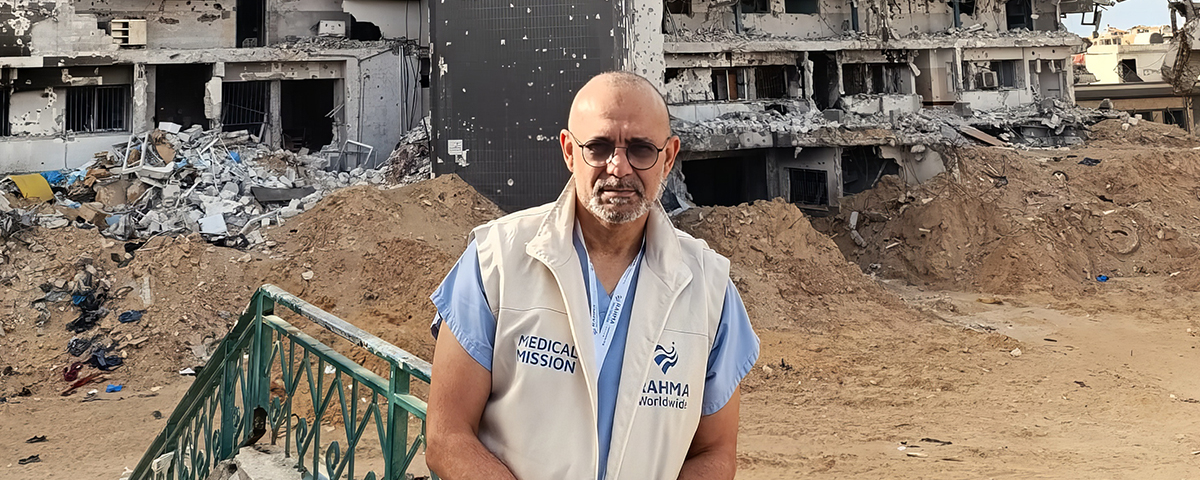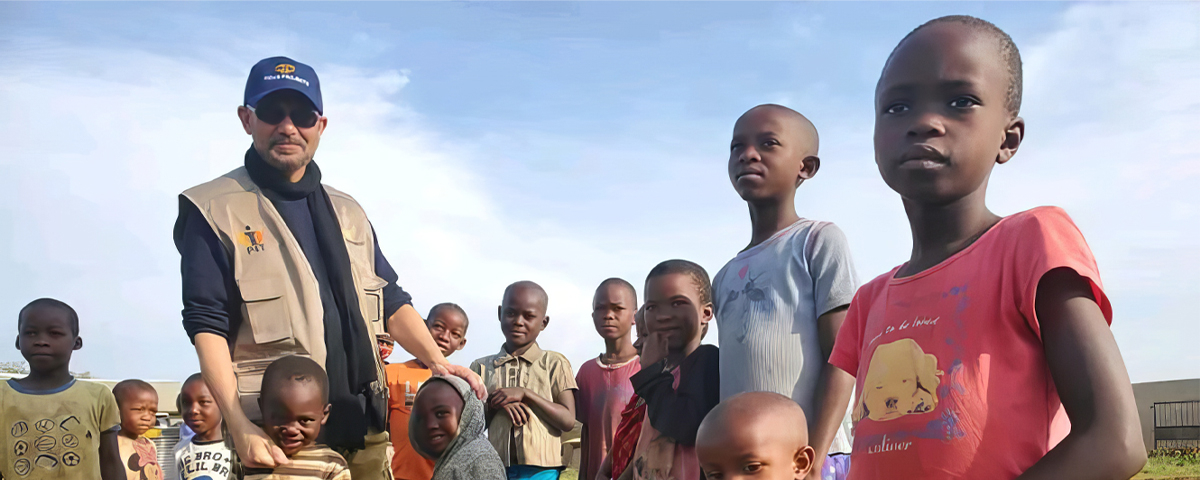Since October 2023, Dr. Lahna has undertaken several medical missions in Gaza. His most recent visit, in July 2024, left him deeply haunted by the images he witnessed. He first went to Gaza in 2009 and has been back many times since, but last year, he says, was different: “After the third visit, I came back completely devastated. It was the first time I felt that we could do nothing. This war is against humanity, against women, against civilization — and the whole world just watches and does nothing.” Even now, it’s hard for him to speak about what he saw. The suffering, the destruction, and the loss remain vivid in his memory. For the first time in his long career, he felt truly hopeless.
“For doctors, it’s a big fight,” he says quietly. “Usually, we fight, and we win — we fight against death, and we win. But when you fight and fight and nothing…” He pauses, unable to find the words. Silence fills the space where words can’t. Gaza was one of his hardest missions, yet, even in exhaustion and grief, he refuses to give up. He hopes to return, though it has become increasingly difficult to enter Gaza.
Born and raised in Casablanca, Morocco, Dr. Zouhair Lahna never dreamed of money or fame. His ambitions were different: he wanted to serve humanity. “When it came to choosing between medicine and engineering — as my father was an engineer — I didn’t hesitate. Medicine meant real contact with people. It meant helping them solve their problems.”
As a young man, he was outraged by the inequalities he saw in Morocco’s public health system. Perhaps that frustration, he reflects, gave him the courage to study harder and think about how to make a difference. As a student, he discovered that empathy could heal as much as medicine: “When I was studying, I didn’t have much to offer patients except kindness, my smile, and my willingness to listen. That’s what I still offer first — hope.”
In 1992, he graduated from Hassan II University of Casablanca with a diploma in General Medicine. He continued his studies in France, earning a diploma in Obstetrics and Gynecology from University René Descartes, Paris, in 1998, followed by a specialization in Pelvic Surgery at University St. Louis Lariboisière, Paris, in 2001. It was in Paris that his humanitarian journey began. A chance encounter with Médecins Sans Frontières (Doctors Without Borders) opened a new path for him. “I told myself, ‘This is what I want to do — bring medicine to people who need it most.’”
He was ready for the field, having learned to save lives with limited resources: “One of my professors taught me how to do good work with very few materials. I never forget that I come from a poor country, so I learned how to give care with less.” His first humanitarian mission was in 1999 on the island nation of Comoros, located off the east coast of Africa. He spent a month there treating patients and training local doctors. “For me, it’s important to give knowledge to people in the field,” he says. “Because when you leave, they stay, and they can keep growing.”
Back in Morocco, he began focusing on surgical cases, especially women suffering from childbirth complications. “Many women live in pain. Some cannot have relations with their husbands and end up divorced. Others suffer from incontinence or fistula. Nobody wants to help them. For me, this is the first human right of women — to allow them to give birth, survive, and have their bodies healed.”
Over the years, Dr. Lahna has performed countless surgeries, led medical training programs, and inspired hundreds of healthcare workers, always guided by one principle: every human being deserves dignity and care. “Some call me a humanitarian doctor or “Doctor of Hope”. Others say I’m a doctor for the poor. I just want to help those who have no one else. Humanitarianism is a philosophy. It puts the human being at the center.”
Whether in a war zone or in his hometown Casablanca, where he established a private clinic offering free treatment to the poor and refugees, his goal has always been the same: to save lives, restore dignity, and bring hope to those most in need. “When you help women heal, when they can give birth again, you become a gateway to their happiness. We share humanity, love, empathy — and through that, we grow.” He pauses to recall a moment that remains etched in his memory: a little girl, Mahdia, around four or five years old, who was severely injured during a missile attack in Idlib, Syria, in 2015. “I have a daughter her age. We managed to save her and after two days, she was taken to Turkey. Now I still keep in touch with her. She’s paralyzed, but she’s alive. That’s what matters. This is war — we do what we can.”
When he thinks about his impact, he doesn’t count numbers. What he values most are the moments of shared knowledge and learning. He also focuses on training midwives, knowing that empowering them saves more women, as they are often the first caregivers during labor and can provide critical care until an ambulance arrives. “Once, a colleague told me, ‘You saved many women. You gave us a lecture about a new surgical technique. We tried it, and now women who used to die are surviving.’ That moment shocked me — I realized you can save lives even when you’re not there. That’s the greatest impact you can have.”
Becoming an Aurora Humanitarian has given Dr. Lahna another chance to amplify his mission. “It’s a great opportunity to share my experience and inspire others, especially young people, not to wait. Just go where you’re needed. I never focused on one place. I don’t wait for things to come to me — I go after them. This Prize is important because it may help people know my work and allow me to be an example for other doctors. That matters most to me. And it will make my mother very happy,” he smiles.
Working with the next generation, he strives to pass on not only his knowledge but also the wisdom and values instilled in him by his teachers. And when students ask how to follow in his footsteps, he offers simple but powerful advice: “First, be competent. A good surgeon must know how to work even without equipment. Second, don’t expect recognition. Be ready for a modest life. And third, be disciplined. Without discipline, you’ll give up after one or two missions.”
Bringing hope and care to others fuels Dr. Zouhair Lahna to continue his mission. Life itself is his greatest inspiration, a gift from God that drives his faith and perseverance through every hardship. “I believe in God. We believe that everything passes, that tomorrow will be better. This philosophy gives people hope and patience.”
The information on this page was last updated on 10/28/2025 and was provided by the Luminary.











